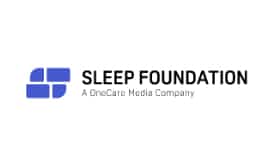Sleep disruption at a glance
Sleep disruption, also called insomnia, can greatly impact your quality of life, but therapies are available to help you achieve quality sleep.
Difficulty falling asleep, staying asleep, or achieving restful sleep are markers of sleep disruption. They can impact your ability to function, may worsen symptoms and side effects during cancer treatment, and may even affect your response to treatment.
Here we discuss ways to manage and improve your sleep quality if you have trouble falling asleep or staying asleep once you’re in bed. If you have difficulty managing your daily schedule to give yourself at least seven hours in bed before you need to get up, see Sleeping Well ›.
Sleep disruption may be a symptom of stress. If stress is contributing to your sleep disruption, see our guide to Managing Stress ›.
Sleep disruption: an overview
What is sleep disruption?
Sleep disruption, also known as insomnia, is characterized by difficulty in falling asleep within a reasonable time, trouble returning to sleep after waking during the night, or an inability to get restful sleep.
Sleep disruption and cancer
Getting seven to eight hours of sleep regularly is one step you can take to improve your resilience and well-being. Adequate and quality sleep may improve your ability to manage side effects and symptoms, reduce your risk of recurrence, and possibly improve your response to treatment.
Unmanaged symptoms such as pain, depression, or anxiety can contribute to insomnia, which in turn can worsen insomnia and other cancer-related symptoms. Nearly two-thirds of people with cancer experience sleep disturbances.1Al Maqbali M, Al Sinani M et al. Prevalence of sleep disturbance in patients with cancer: a systematic review and meta-analysis. Clinical Nursing Research. 2022 Jul;31(6):1107-1123.
We review the evidence of links between sleep and cancer, and between sleep and side effects and symptoms, in Sleeping Well ›.
What can cause or trigger sleep disruption?
Many factors can interfere with the quality of sleep: “These include unresolved stress, a noisy bedroom environment, too much light in the bedroom, a bedroom that is too warm, hormonal issues such as hot flashes, too much alcohol, insufficient protein in the evening meal, and side effects of medications.”2Alschuler LN, Gazella KA. The Definitive Guide to Cancer, 3rd Edition: An Integrative Approach to Prevention, Treatment, and Healing. Berkeley, California: Celestial Arts. 2010.
Medical conditions
Many medical conditions can contribute to sleep disruption. According to the National Comprehensive Cancer Network, these include pain, emotional distress, fatigue, or alcohol and substance use; cardiac, endocrine, or respiratory disorders; anemia; and neurological problems, including neuropathy from chemotherapy.3Sanft T, Day A et al. NCCN Guidelines® Insights: Survivorship, Version 1.2023. Journal of the National Comprehensive Cancer Network. 2023 Aug;21(8):792-803. Changes in the gut microbiome have also been associated with sleep disturbance among people with cancer, but it is not clear in which direction the link operates.4Yao ZW, Zhao BC et al. Relationships of sleep disturbance, intestinal microbiota, and postoperative pain in breast cancer patients: a prospective observational study. Sleep and Breathing. 2021 Sep;25(3):1655-1664. The increased incidence of depression, inflammation, and illness among people with cancer may also be a factor in why people with cancer report insomnia at twice the rate as the general population.5Azizoddin DR, Soens MA et al. Perioperative sleep disturbance following mastectomy: a longitudinal investigation of the relationship to pain, opioid use, treatment, and psychosocial symptoms. Journal of Clinical Oncology. 2023 Feb 1;39(2):76-84; Irwin MR. Depression and insomnia in cancer: prevalence, risk factors, and effects on cancer outcomes. Current Psychiatry Reports. 2013 Nov;15(11):404. Also see our handbooks on Pain ›, Depression ›, and Anxiety ›.
Medications and therapies
Opioid pain medications (such as codeine, morphine, oxycodone, and tramadol)6Robertson JA, Purple RJ et al. Sleep disturbance in patients taking opioid medication for chronic back pain. Anaesthesia. 2016 Nov;71(11):1296-1307; Rosen IM, Aurora RN et al. & American Academy of Sleep Medicine Board of Directors. Chronic Opioid Therapy and Sleep: An American Academy of Sleep Medicine Position Statement. Journal of Clinical Sleep Medicine. 2019 Nov 15;15(11):1671-1673., antiemetics (such as dexamethasone), antihistamines, antidepressants, and antipsychotics can all contribute to sleep disruption.7Sanft T, Day A et al. NCCN Guidelines® Insights: Survivorship, Version 1.2023. Journal of the National Comprehensive Cancer Network. 2023 Aug;21(8):792-803. Check the inserts of any prescription medications you use or ask your pharmacist if you have concerns.
Therapies that we have reviewed that may trigger sleep disruption:
- Insomnia is a common side effect of nonsteroidal anti-inflammatory drugs (NSAIDs ›
- Difficulty sleeping, nightmares, and vivid dreams during the first week of use are reported side effects of low-dose naltrexone ›
Lifestyle and behavior
Insomnia is often related to lifestyle choices and situations that take us away from our natural rhythms and that promote inactivity:
- Overeating, eating foods that interfere with sleep promotion, or eating late in the evening or at night
- Consuming food or beverages with caffeine, including energy drinks
- Overwork or nighttime work
- Staying up late and looking at television, computer and/or cell phone screens for long hours, especially late in the evening
- Chronic unmanaged stress
- Opioid use
- Alcohol use
Environmental factors
Certain factors in your environment can affect sleep:
- Light: When we are exposed to light, and what type we are exposed to, can affect our sleep.
- There is some evidence that exposure to the blue light emitted by phone and computer screens may disrupt sleep, but the issue has not been well studied.8Tähkämö L, Partonen T, Pesonen AK. Systematic review of light exposure impact on human circadian rhythm. Chronobiology International. 2019 Feb;36(2):151-170; Silvani MI, Werder R, Perret C. The influence of blue light on sleep, performance and wellbeing in young adults: A systematic review. Frontiers in Physiology. 2022 Aug 16;13:943108.
- There is evidence that people exposed to even low levels of ambient light overnight (for example, from a street lamp or TV) have worse sleep.9Sweeney MR, Nichols HB et al. Exposure to indoor light at night in relation to multiple dimensions of sleep health: findings from the Sister Study. Sleep. 2024 Feb 8;47(2):zsad100; Tähkämö L, Partonen T, Pesonen AK. Systematic review of light exposure impact on human circadian rhythm. Chronobiology International. 2019 Feb;36(2):151-170; Wang Y, Zhao X et al. The effect of light therapy on insomnia: A systematic review and meta-analysis. Sleep and Breathing. 2024 Dec 29;29(1):66.
- Using eye masks and/or blackout curtains at night, and exposing ourselves to bright light in the morning, can help to improve sleep by maintaining the body’s circadian rhythm.10Greco V, Bergamo D et al. Wearing an eye mask during overnight sleep improves episodic learning and alertness. Sleep. 2023 Mar 9;46(3):zsac305; Wang Y, Zhao X et al. The effect of light therapy on insomnia: A systematic review and meta-analysis. Sleep and Breathing. 2024 Dec 29;29(1):66.
- Electromagnetic fields: Some people suggest that electromagnetic fields from electrical wires, wi-fi, or phone signals may disrupt sleep. However, evidence to date does not support a link.11Röösli M, Dongus S et al. The effects of radiofrequency electromagnetic fields exposure on tinnitus, migraine and non-specific symptoms in the general and working population: A systematic review and meta-analysis on human observational studies. Environment International. 2024 Jan;183:108338; Mohler E, Frei P et al. Exposure to radiofrequency electromagnetic fields and sleep quality: a prospective cohort study. PLoS One. 2012;7(5):e37455.
Our Creating a Healing Environment › handbook includes details of the evidence regarding environmental exposures and sleep disruption, plus strategies for reducing exposures.
Top evidence-based practices and therapies for managing sleep disruption
Conventional therapies
There are many well-known medications for insomnia, including benzodiazepines such as diazepam (Valium), sedatives like eszopiclone (Lunesta), and anticonvulsants like gabapentin. These can be effective in treating short-term insomnia (2-4 weeks),12Zheng X, He Y et al. Pharmacological interventions for the treatment of insomnia: quantitative comparison of drug efficacy. Sleep Medicine. 2020 Aug;72:41-49. but if used for a longer time, they can have serious side effects, including addiction.13Momin R, Ketvertis K. Short-term insomnia. StatPearls. 17 Jul 2023. There is good evidence that melatonin and melatonin receptor agonists like ramelteon (Rozerem) can improve sleep.14Kuriyama A, Honda M, Hayashino Y. Ramelteon for the treatment of insomnia in adults: a systematic review and meta-analysis. Sleep Medicine. 2014 Apr;15(4):385-92; Zhang Q, Gao F, Zhang S, Sun W, Li Z. Prophylactic use of exogenous melatonin and melatonin receptor agonists to improve sleep and delirium in the intensive care units: a systematic review and meta-analysis of randomized controlled trials. Sleep & Breathing. 2019 Dec;23(4):1059-1070; Liu J, Wang LN. Ramelteon in the treatment of chronic insomnia: systematic review and meta-analysis. International Journal of Clinical Practice. 2012 Sep;66(9):867-73. Melatonin › has many other benefits and is one of CancerChoices’ top-rated therapies.
As many as 20% of Americans have sleep apnea, a condition where breathing stops and starts during sleep.15Franklin KA, Lindberg E. Obstructive sleep apnea is a common disorder in the population-a review on the epidemiology of sleep apnea. Journal of Thoracic Disease. 2015 Aug;7(8):1311-22. If sleep apnea is contributing to sleep disruption, a continuous positive airway pressure (CPAP) machine can help.16Shang W, Zhang Y, Wang G, Han D. Benefits of continuous positive airway pressure on glycaemic control and insulin resistance in patients with type 2 diabetes and obstructive sleep apnoea: a meta-analysis. Diabetes, Obesity and Metabolism. 2021 Feb;23(2):540-548.
Lifestyle practices
Minimizing alcohol use
Drinking alcohol habitually is associated with worse sleep across many studies.17Zhong L, Han X et al. Modifiable dietary factors in adolescent sleep: A systematic review and meta-analysis. Sleep Medicine. 2024 Mar;115:100-108; Meneo D, Bacaro V et al. A systematic review and meta-analysis of the association between young adults’ sleep habits and substance use, with a focus on self-medication behaviours. Sleep Medicine Review. 2023 Aug;70:101792. Contrary to the belief that alcohol helps with sleep, people who drink alcohol shortly before bed have also shown worse sleep quality.18Pabon E, Greenlund IM et al. Effects of alcohol on sleep and nocturnal heart rate: Relationships to intoxication and morning-after effects. Alcohol, Clinical and Experimental Research. 2022 Oct;46(10):1875-1887; Greenlund IM, Cunningham HA et al. Morning sympathetic activity after evening binge alcohol consumption. American Journal of Physiology: Heart and Circulatory Physiology. 2021 Jan 1;320(1):H305-H315; National Comprehensive Cancer Network. Survivorship care for cancer-related late and long-term effects. 2024. For help reducing the amount of alcohol you drink, talk to your doctor or find local treatment options through the Substance Abuse and Mental Health Services Administration ›
Moving More
Exercising during the day promotes better sleep in many ways, including reducing stress and inflammation and increasing the body’s production of melatonin (a hormone that regulates sleep).19Alnawwar MA, Alraddadi MI et al. The effect of physical activity on sleep quality and sleep disorder: a systematic review. Cureus. 2023 Aug 16;15(8):e43595. People with cancer and cancer survivors who get moderate exercise have shown better sleep across many studies.20Singh B, Spence R et al. Exercise for individuals with lung cancer: a systematic review and meta-analysis of adverse events, feasibility, and effectiveness. Seminars in Oncology Nursing. 2020 Oct;36(5):151076; Wu C, Zheng Y et al. Nonpharmacological Interventions for cancer-related fatigue: a systematic review and Bayesian network meta-analysis. Worldviews on Evidence-Based Nursing. 2019 Apr;16(2):102-110; Gururaj R, Samuel SR et al. Effect of exercise based interventions on sleep and circadian rhythm in cancer survivors—a systematic review and meta-analysis. PeerJ. 2024 Mar 8;12:e17053. The kinds of gentle exercise many experts recommend for people with cancer include Tai Chi and Qigong ›, walking, and yoga ›. See 7 Lifestyle Practices: Moving More ›
Sleep hygiene
Good sleep hygiene includes these practices:21Sanft T, Day A et al. NCCN Guidelines® Insights: Survivorship, Version 1.2023. Journal of the National Comprehensive Cancer Network. 2023 Aug;21(8):792-803; National Sleep Foundation. Sleep Hygiene. Viewed November 6, 2021; Alschuler LN, Gazella KA. The Definitive Guide to Cancer, 3rd Edition: An Integrative Approach to Prevention, Treatment, and Healing. Berkeley, California: Celestial Arts. 2010; Block KI. Life Over Cancer: The Block Center Program for Integrative Cancer Care. New York: Bantam Dell. 2009.
- Set your sleep schedule: try to get to bed and wake up at relatively similar times each day.
- Follow a nightly routine.
- Avoid bright lights in the evening and night.
- Limit screen time, heavy meals, fluid intake, alcohol, nicotine, and caffeine near bedtime.
- Unplug from electronics and the blue light from television, computer, and phone screens late in the evening.
- Engage in relaxation or winding-down activities before bedtime.
- Get exposure to daylight, especially in the morning.
- Get physical activity.
- Don’t dine late in the day—try to finish eating at least 3 hours before bedtime.
- Reserve your bed for sleeping and intimacy, but not other activities such as watching television, phone conversations, or eating.
- Make your bedroom comfortable and conducive to sleep, including keeping it dark, quiet, and not too warm, and get a comfortable bed and pillow if possible.
Complementary therapies
Natural products or supplements
- Ashwagandha (Withania somnifera) is a plant whose root is used in Ayurveda to combat stress and anxiety. People without cancer taking ashwagandha have shown slightly better sleep across many studies.22Fatima K, Malik J et al. Safety and efficacy of Withania somnifera for anxiety and insomnia: Systematic review and meta-analysis. Human Psychopharmacology. 2024 Nov;39(6):e2911; Baker C, Kirby JB et al. The perceived impact of ashwagandha on stress, sleep quality, energy, and mental clarity for college students: qualitative analysis of a double-blind randomized control trial. Journal of Medicinal Food. 2022 Dec;25(12):1095-1101. Ashwagandha is associated with some medical risks related to hormone imbalance, so it is a good idea to consult with a practitioner before taking it.23Sharma AK, Basu I, Singh S. Efficacy and safety of ashwagandha root extract in subclinical hypothyroid patients: a double-blind, randomized placebo-controlled trial. Journal of Alternative and Complementary Medicine 2018;24:243-8; Mikulska P, Malinowska M et al. Ashwagandha (Withania somnifera)-current research on the health-promoting activities: a narrative review. Pharmaceutics. 2023 Mar 24;15(4):1057. Find an integrative practitioner ›
- Chamomile: People without cancer taking chamomile have shown better sleep quality across many studies.24Hieu TH, Dibas M et al. Therapeutic efficacy and safety of chamomile for state anxiety, generalized anxiety disorder, insomnia, and sleep quality: a systematic review and meta-analysis of randomized trials and quasi-randomized trials. Phytotherapy Research. 2019 Jun;33(6):1604-1615; Rasool A, Ishtiaq A, Rehman B. Outcome of use of high quality chamomile extract on sleep disorders occuring after menopause. Journal of Medicine, Physiology, and Biophysics. 2019;52.
- Chinese herbal blends are used in Traditional Chinese Medicine (TCM). At least one clinical practice guideline recommends herbal blends for sleep disruption in people receiving palliative care for cancer.25Lam WC, Zhong L et al. Hong Kong Chinese medicine clinical practice guideline for cancer palliative care: pain, constipation, and insomnia. Evidence-Based Complementary and Alternative Medicine. 2019 Jan 22;2019:1038206. A TCM practitioner can advise you on which herbal blends may help with sleep disruption. It is important to tell your oncologist about any herbal medicines you are taking. For help finding a traditional Chinese medicine practitioner, see Traditional Chinese Medicine in Cancer Care ›
- Lavender: People with cancer using lavender oil for aromatherapy have shown better sleep across many studies.26Cheng H, Lin L et al. Aromatherapy with single essential oils can significantly improve the sleep quality of cancer patients: a meta-analysis. BMC Complementary Medicine and Therapies. 2022 Jul 14;22(1):187; Yildirim D, Harman Ozdogan M et al. The efficacy of lavender oil on fatigue and sleep quality in patients with hematological malignancy receiving chemotherapy: a single-blind randomized controlled trial. Supportive Care in Cancer. 2025 Jan 8;33(2):79; Dyer J, Cleary L et al. The use of aromasticks to help with sleep problems: A patient experience survey. Complementary Therapies in Clinical Practice. 2016 Feb;22:51-8. Safety note: Lavender oil (as with some other essential oils) has estrogenic properties at some concentrations.27Simões BM, Kohler B et al. Estrogenicity of essential oils is not required to relieve symptoms of urogenital atrophy in breast cancer survivors. Therapeutic Advances in Medical Oncology. 2018 Apr 2;10:1758835918766189; Henley DV, Lipson N, Korach KS, Bloch CA. Prepubertal gynecomastia linked to lavender and tea tree oils. New England Journal of Medicine. 2007 Feb 1;356(5):479-85; Diaz A, Luque L, Badar Z, Kornic S, Danon M. Prepubertal gynecomastia and chronic lavender exposure: report of three cases. Journal of Pediatric Endocrinology & Metabolism. 2016 Jan;29(1):103-7; Politano VT, McGinty D et al. Uterotrophic assay of percutaneous lavender oil in immature female rats. International Journal of Toxicology. 2013 Mar-Apr;32(2):123-9; Shinohara K, Doi H, Kumagai C, Sawano E, Tarumi W. Effects of essential oil exposure on salivary estrogen concentration in perimenopausal women. Neuroendocrinology Letters. 2017 Jan;37(8):567-572; Henley DV, Korach KS. Physiological effects and mechanisms of action of endocrine disrupting chemicals that alter estrogen signaling. Hormones (Athens). 2010 Jul-Sep;9(3):191-205. It might be wise to avoid skin application of lavender oil if you have an estrogen-positive breast cancer diagnosis.
- Melatonin is produced naturally by the pineal gland during the early hours of night, signaling and initiating the transition from wakefulness to sleep. People undergoing treatment for cancer have shown better sleep when taking melatonin.28Chen WY, Giobbie-Hurder A et al. A randomized, placebo-controlled trial of melatonin on breast cancer survivors: impact on sleep, mood, and hot flashes. Breast Cancer Research and Treatment. 2014;145(2):381-388; Palmer ACS, Zortea M et al. Clinical impact of melatonin on breast cancer patients undergoing chemotherapy; effects on cognition, sleep and depressive symptoms: A randomized, double-blind, placebo-controlled trial. PLoS One. 2020 Apr 17;15(4):e0231379; Innominato PF, Lim AS et al. The effect of melatonin on sleep and quality of life in patients with advanced breast cancer. Supportive Care in Cancer. 2016 Mar;24(3):1097-105. See Melatonin: Affordability and access ›
- Intravenous Vitamin C: Vitamin C, or ascorbic acid, is an essential nutrient for growth, development, and healing. People with cancer (mostly breast cancer) treated with intravenous Vitamin C have shown better sleep in several studies.29Mansoor F, Kumar S et al. Impact of intravenous vitamin C administration in reducing severity of symptoms in breast cancer patients during treatment. Cureus. 2021;13(5):e14867; Vollbracht C, Schneider B et al. Intravenous vitamin C administration improves quality of life in breast cancer patients during chemo-/radiotherapy and aftercare: results of a retrospective, multicentre, epidemiological cohort study in Germany. In Vivo. 2011;25(6):983-90; Takahashi H, Mizuno H, Yanaqisawa A. High-dose intravenous vitamin C improves quality of life in cancer patients. Personalized Medicine Universe. 2012;1(1):49. See Intravenous Vitamin C: Affordability and access ›
Other complementary therapies
- Acupressure applies pressure at acupoints—specific places on your body—for targeted effects, such as releasing muscle tension or promoting blood circulation. People treated with acupressure show better sleep, including during chemotherapy, across many studies.30Hepp N. How can acupressure help you? What the research says. CancerChoices. October 16, 2024. See Acupressure: Affordability and access ›
- Acupuncture is a practice of inserting fine needles into the body at specific points. People treated with acupuncture show less sleep disturbance, including during cancer treatment, across many studies.31Hepp N. How can acupuncture help you? What the research says. CancerChoices. August 28, 2024; Cancer Australia. Management of menopausal symptoms in women with a history of breast cancer. 2024. See Acupuncture: Affordability and access ›
- Cognitive Behavioral Therapy for Insomnia (CBT-I) is a type of cognitive behavioral therapy that helps people improve their sleep hygiene and to identify and dispel counterproductive worries around falling and staying asleep. People with cancer treated with CBT-I showed better measures of sleep across many studies, sometimes with improvements lasting several months after CBT-I.32Nissen ER, Neumann H et al. Interventions for insomnia in cancer patients and survivors-a comprehensive systematic review and meta-analysis. JNCI Cancer Spectrum. 2024 Apr 30;8(3):pkae041; Gao Y, Liu M et al. Cognitive behavior therapy for insomnia in cancer patients: a systematic review and network meta-analysis. Journal of Evidence Based Medicine. 2022 Sep;15(3):216-229; Squires LR, Rash JA et al. Systematic review and meta-analysis of cognitive-behavioural therapy for insomnia on subjective and actigraphy-measured sleep and comorbid symptoms in cancer survivors. Sleep Medicine Review. 2022 Jun;63:101615; Ma Y, Hall DL et al. Efficacy of cognitive behavioral therapy for insomnia in breast cancer: a meta-analysis. Sleep Medicine Review. 2021 Feb;55:101376; Cancer Australia. Management of menopausal symptoms in women with a history of breast cancer. 2024; National Comprehensive Cancer Network. Survivorship care for cancer-related late and long-term effects. 2024. Find a CBT-I practitioner in Perelman School of Medicine’s CBT-I International Directory › or Stellar Sleep’s app › developed at Harvard University.
- Electroacupuncture is a modified form of acupuncture. Electroacupuncture involves inserting very thin needles at specific points on the body. A mild electric current passes between the needles, stimulating the target. People treated with electroacupuncture show less sleep disturbance, including when managing pain related to cancer treatment, across many studies.33Hepp N, Pole L. How can electroacupuncture help you? What the research says. CancerChoices. August 28, 2024. See Electroacupuncture: Affordability and access ›
- Hypnotherapy induces a trancelike (hypnotic) state in which a person is relaxed and suggestible. People with cancer treated with both self-hypnosis and hypnosis by a therapist have shown better sleep.34Grégoire C, Faymonville M et al. Randomized, controlled trial of an intervention combining self-care and self-hypnosis on fatigue, sleep, and emotional distress in posttreatment cancer patients: 1-year follow-up. International Journal of Clinical and Experimental Hypnosis. 2022 Apr-Jun;70(2):136-155; Elkins G, Marcus J et al. Randomized trial of a hypnosis intervention for treatment of hot flashes among breast cancer survivors. Journal of Clinical Oncology. 2008 Nov 1;26(31):5022-6; Bissonnette J, Dumont E et al. Hypnosis and music interventions for anxiety, pain, sleep and well-being in palliative care: systematic review and meta-analysis. BMJ Supportive and Palliative Care. 2024 Jan 8;13(e3):e503-e514; Cancer Australia. Management of menopausal symptoms in women with a history of breast cancer. 2024; Deng GE, Frenkel M et al; Society for Integrative Oncology. Evidence-based clinical practice guidelines for integrative oncology: complementary therapies and botanicals. Journal of the Society of Integrative Oncology. 2009 Summer;7(3):85-120. Many clinicians offer hypnosis or similar treatment; you can find a therapist who is specially trained in hypnotherapy through the American Society of Clinical Hypnosis ›
- Massage therapy: people with cancer, including advanced and metastatic cancer, have shown better sleep after being treated with massage, with and without aromatherapy, across many studies.35Epstein AS, Liou KT et al. Acupuncture vs massage for pain in patients living with advanced cancer: the IMPACT randomized clinical trial. JAMA Network Open. 2023 Nov 1;6(11):e2342482; Toth M, Marcantonio ER et al. Massage therapy for patients with metastatic cancer: a pilot randomized controlled trial. Journal of Alternative and Complementary Medicine. 2013 Jul;19(7):650-6; Miladinia M, Jahangiri M et al. Determining massage dose-response to improve cancer-related symptom cluster of pain, fatigue, and sleep disturbance: A 7-arm randomized trial in palliative cancer care. Palliative Medicine. 2023 Jan;37(1):108-119; Jane SW, Chen SL et al. Effects of massage on pain, mood status, relaxation, and sleep in Taiwanese patients with metastatic bone pain: a randomized clinical trial. Pain. 2011 Oct;152(10):2432-2442; Soden K, Vincent K, Craske S, Lucas C, Ashley S. A randomized controlled trial of aromatherapy massage in a hospice setting. Palliative Medicine. 2004 Mar;18(2):87-92; Yaman O, Aygin D et al. The effects of aromatherapy massage given to patients after colorectal cancer surgery on symptom management: a randomized controlled study. Complementary Therapies in Clinical Practice. 2024 Nov;57:101900. See Massage Therapy ›
- Meditation can take many forms. A common one is Mindfulness-Based Stress Reduction (MBSR), an 8-week course that uses awareness of the body and breath to help students become more present in their bodies and aware of the world around them. People with cancer and cancer survivors taking an 8-week MBSR course have shown better sleep across many studies,36Suh HW, Jeong HY et al. The mindfulness-based stress reduction program for improving sleep quality in cancer survivors: A systematic review and meta-analysis. Complementary Therapies in Medicine. 2021 Mar;57:102667. with effects lasting at least six months.37Han J, Cheng HL et al. Mind-body therapies for sleep disturbance among patients with cancer: A systematic review and meta-analysis. Complementary Therapies in Medicine. 2023 Aug;75:102954; Deng GE, Frenkel M et al; Society for Integrative Oncology. Evidence-based clinical practice guidelines for integrative oncology: complementary therapies and botanicals. Journal of the Society of Integrative Oncology. 2009 Summer;7(3):85-120. Many hospitals and medical centers offer MBSR courses. Alternatively, you can try the Headspace › or Calm › apps.
- Music therapy involves listening to music and sometimes participating in music-making. People with sleep disturbances treated with music therapy have shown better sleep quality across many studies.38Soh PQP, Wong WHT et al. Effectiveness of non-pharmacological interventions in improving sleep quality after cardiac surgery: A systematic review and meta-analysis. Journal of Clinical Nursing. 2024 Jun;33(6):2084-2098; Thondala B, Pawar H et al. The effect of non-pharmacological interventions on sleep quality in people with sleep disturbances: A systematic review and a meta-analysis. Chronobiology International. 2023 Oct 3;40(10):1333-1353; Deng GE, Frenkel M et al; Society for Integrative Oncology. Evidence-based clinical practice guidelines for integrative oncology: complementary therapies and botanicals. Journal of the Society of Integrative Oncology. 2009 Summer;7(3):85-120. People who simply listened to calming music before bed also showed improved sleep across many studies.39Zhao N, Lund HN, Jespersen KV. A systematic review and meta-analysis of music interventions to improve sleep in adults with mental health problems. European Psychiatry. 2024 Oct 7;67(1):e62; Jespersen KV, Hansen MH, Vuust P. The effect of music on sleep in hospitalized patients: A systematic review and meta-analysis. Sleep Health. 2023 Aug;9(4):441-448. Your oncology team can likely refer you to a music therapist, or you can find one through the American Music Therapy Association › or the Certification Board for Music Therapists ›
- Reflexology is based on the theory that direct pressure on a nerve in the foot can stimulate a corresponding area of the body, relieving certain symptoms. People with cancer treated with foot reflexology have shown better sleep quality across many studies.40Babamiri B, Pourbahram R et al. Effects of acupuncture and foot reflexology on sleep quality in patients with acute lymphoblastic leukemia: A clinical trial. Explore (NY). 2025 Jan-Feb;21(1):103101; Parizad N, Hassanpour A, Goli R, Khalkhali H, Nozad A. Comparing the efficacy of acupressure and foot reflexology on sleep quality in patients with leukemia: a comparative clinical trial. Integrative Cancer Therapies. 2024 Jan-Dec;23:15347354241261356; Rambod M, Pasyar N, Shamsadini M. The effect of foot reflexology on fatigue, pain, and sleep quality in lymphoma patients: A clinical trial. European Journal of Oncology Nursing. 2019 Dec;43:101678. For more on finding a reflexologist, see this advice from the University of Minnesota Medical School › or try the directories of the Reflexology Association of America › or the American Reflexology Certification Board ›
- Tai chi and qigong are both traditional Chinese mind-body practices that combine slow, graceful movements, controlled breathing, and meditation. People with cancer practicing tai chi or qigong showed better sleep across many studies, with more consistent effects for tai chi than qigong.41Hepp N. How can tai chi or qigong help you? What the research says. CancerChoices. August 28, 2024; Deng GE, Frenkel M et al; Society for Integrative Oncology. Evidence-based clinical practice guidelines for integrative oncology: complementary therapies and botanicals. Journal of the Society of Integrative Oncology. 2009 Summer;7(3):85-120. See Tai chi or qigong: Affordability and access ›
- Yoga is a practice originating in ancient India combining movement and stretches with meditation. People with cancer practicing yoga, including people experiencing pain and side effects from treatment, have shown better sleep across many studies.42Hepp N, Pole L. How can yoga help you? What the research says. CancerChoices. October 22, 2024; Deng GE, Frenkel M et al; Society for Integrative Oncology. Evidence-based clinical practice guidelines for integrative oncology: complementary therapies and botanicals. Journal of the Society of Integrative Oncology. 2009 Summer;7(3):85-120; Cancer Australia. Management of menopausal symptoms in women with a history of breast cancer. 2024. See Yoga: Affordability and access ›
Recommended against use
Some therapies have recommendations against use for sleep disruption in one or more clinical practice guidelines due to evidence that they are not effective:
- Isoflavones
- Vitamin E
Healing stories
Helpful links
Learn more
References






